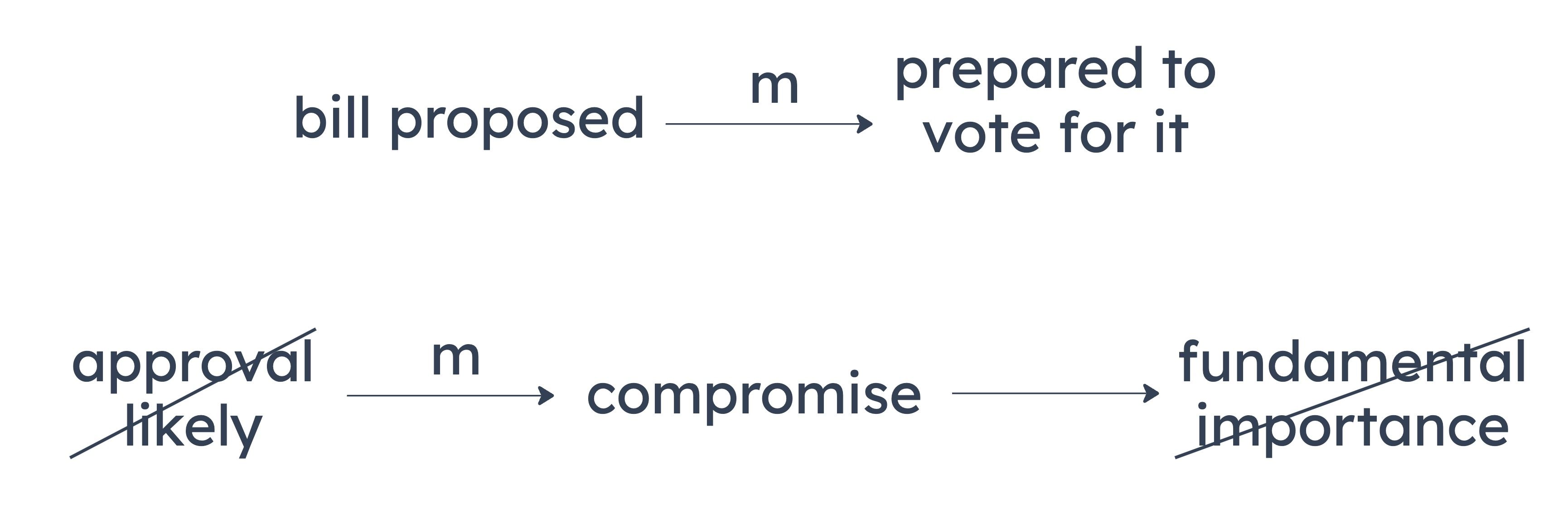LSAT 152 – Section 2 – Question 24
LSAT 152 - Section 2 - Question 24
November 2018You need a full course to see this video. Enroll now and get started in less than a minute.
Target time: 1:28
This is question data from the 7Sage LSAT Scorer. You can score your LSATs, track your results, and analyze your performance with pretty charts and vital statistics - all with a Free Account ← sign up in less than 10 seconds
| Question QuickView |
Type | Tags | Answer Choices |
Curve | Question Difficulty |
Psg/Game/S Difficulty |
Explanation |
|---|---|---|---|---|---|---|---|
| PT152 S2 Q24 |
+LR
+Exp
| Must be false +MBF Conditional Reasoning +CondR Quantifier +Quant | A
11%
160
B
13%
161
C
63%
164
D
7%
157
E
6%
157
|
144 157 170 |
+Harder | 147.463 +SubsectionMedium |
Political scientist: When a bill comes before a legislative body, the majority of the representatives are usually prepared to vote for it. Moreover, when a bill is at first unlikely to get approval by the majority, a compromise regarding the content of the bill is usually possible, allowing its passage into law. Such compromises are impossible, however, when the bill concerns an issue of fundamental importance to a large bloc of representatives.
Summary
When a bill comes before a legislative body, most representatives are prepared to vote for it. Most of the time when a bill is unlikely to get approval by the majority, compromise regarding the content is possible. Compromise is impossible, however, when the bill concerns an issue of fundamental importance to a large bloc of representatives.

Notable Valid Inferences
Most bills concerning issues of fundamental importance to a large bloc of representatives do not pass into law following compromise.
A
Compromises regarding issues of fundamental importance to large blocs of representatives in the legislature usually do not enable the passage of any bill into law.
Must be true. The stimulus tells us that compromise is not possible when a bill concerns issues of fundamental importance to a large bloc of representatives. Therefore, this type of compromise does not enable the passage of any bill into law.
B
Most bills that do not concern any issues of fundamental importance to any large bloc of representatives in the legislature pass into law.
Could be true. We don’t have any information in the stimulus to contradict this idea. It is possible that most of these types of bills pass into law, if there are any at all.
C
Most bills concerning issues of fundamental importance to a large bloc of representatives pass into law as a result of compromises over the bills’ contents.
Must be false. As shown on our diagram, compromise is possible only if the bill does not concern issues of fundamental importance to a large bloc of representatives. 
D
Most bills concern issues of fundamental importance to at least one large bloc of representatives in the legislature.
Could be true. We don’t have any information in the stimulus about the content of most bills.
E
Most bills do not concern any issues of fundamental importance to any large bloc of representatives in the legislature.
Could be true. We don’t have any information in the stimulus about the content of most bills.
Take PrepTest
Review Results
LSAT PrepTest 152 Explanations
Section 1 - Logical Reasoning
- Question 01
- Question 02
- Question 03
- Question 04
- Question 05
- Question 06
- Question 07
- Question 08
- Question 09
- Question 10
- Question 11
- Question 12
- Question 13
- Question 14
- Question 15
- Question 16
- Question 17
- Question 18
- Question 19
- Question 20
- Question 21
- Question 22
- Question 23
- Question 24
- Question 25
Section 2 - Logical Reasoning
- Question 01
- Question 02
- Question 03
- Question 04
- Question 05
- Question 06
- Question 07
- Question 08
- Question 09
- Question 10
- Question 11
- Question 12
- Question 13
- Question 14
- Question 15
- Question 16
- Question 17
- Question 18
- Question 19
- Question 20
- Question 21
- Question 22
- Question 23
- Question 24
- Question 25
Section 3 - Reading Comprehension
- Passage 1 – Passage
- Passage 1 – Questions
- Passage 2 – Passage
- Passage 2 – Questions
- Passage 3 – Passage
- Passage 3 – Questions
- Passage 4 – Passage
- Passage 4 – Questions
Leave a Reply
You must be logged in to post a comment. You can get a free account here.